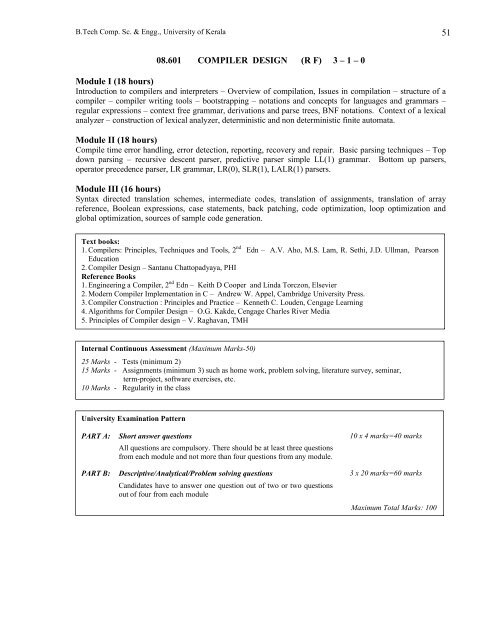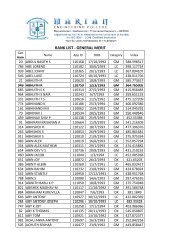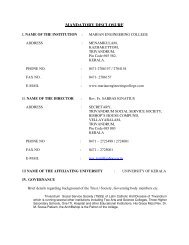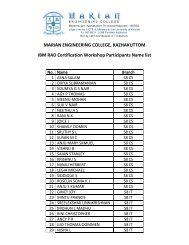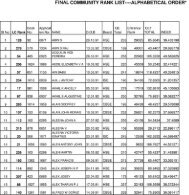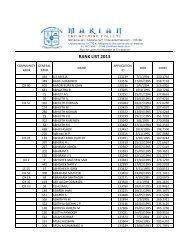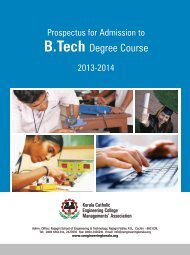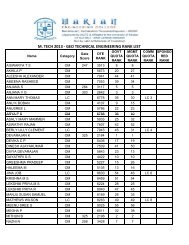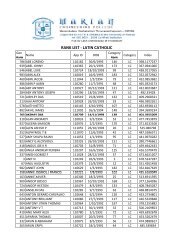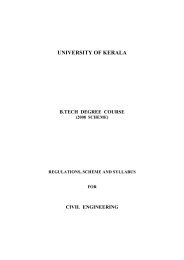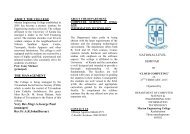UNIVERSITY OF KERALA - Marian Engineering College
UNIVERSITY OF KERALA - Marian Engineering College
UNIVERSITY OF KERALA - Marian Engineering College
Create successful ePaper yourself
Turn your PDF publications into a flip-book with our unique Google optimized e-Paper software.
B.Tech Comp. Sc. & Engg., University of Kerala 51<br />
08.601 COMPILER DESIGN (R F) 3 – 1 – 0<br />
Module I (18 hours)<br />
Introduction to compilers and interpreters – Overview of compilation, Issues in compilation – structure of a<br />
compiler – compiler writing tools – bootstrapping – notations and concepts for languages and grammars –<br />
regular expressions – context free grammar, derivations and parse trees, BNF notations. Context of a lexical<br />
analyzer – construction of lexical analyzer, deterministic and non deterministic finite automata.<br />
Module II (18 hours)<br />
Compile time error handling, error detection, reporting, recovery and repair. Basic parsing techniques – Top<br />
down parsing – recursive descent parser, predictive parser simple LL(1) grammar. Bottom up parsers,<br />
operator precedence parser, LR grammar, LR(0), SLR(1), LALR(1) parsers.<br />
Module III (16 hours)<br />
Syntax directed translation schemes, intermediate codes, translation of assignments, translation of array<br />
reference, Boolean expressions, case statements, back patching, code optimization, loop optimization and<br />
global optimization, sources of sample code generation.<br />
Text books:<br />
1. Compilers: Principles, Techniques and Tools, 2 nd Edn – A.V. Aho, M.S. Lam, R. Sethi, J.D. Ullman, Pearson<br />
Education<br />
2. Compiler Design – Santanu Chattopadyaya, PHI<br />
Reference Books<br />
1. <strong>Engineering</strong> a Compiler, 2 nd Edn – Keith D Cooper and Linda Torczon, Elsevier<br />
2. Modern Compiler Implementation in C – Andrew W. Appel, Cambridge University Press.<br />
3. Compiler Construction : Principles and Practice – Kenneth C. Louden, Cengage Learning<br />
4. Algorithms for Compiler Design – O.G. Kakde, Cengage Charles River Media<br />
5. Principles of Compiler design – V. Raghavan, TMH<br />
Internal Continuous Assessment (Maximum Marks-50)<br />
25 Marks - Tests (minimum 2)<br />
15 Marks - Assignments (minimum 3) such as home work, problem solving, literature survey, seminar,<br />
term-project, software exercises, etc.<br />
10 Marks - Regularity in the class<br />
University Examination Pattern<br />
PART A: Short answer questions 10 x 4 marks=40 marks<br />
All questions are compulsory. There should be at least three questions<br />
from each module and not more than four questions from any module.<br />
PART B: Descriptive/Analytical/Problem solving questions 3 x 20 marks=60 marks<br />
Candidates have to answer one question out of two or two questions<br />
out of four from each module<br />
Maximum Total Marks: 100


